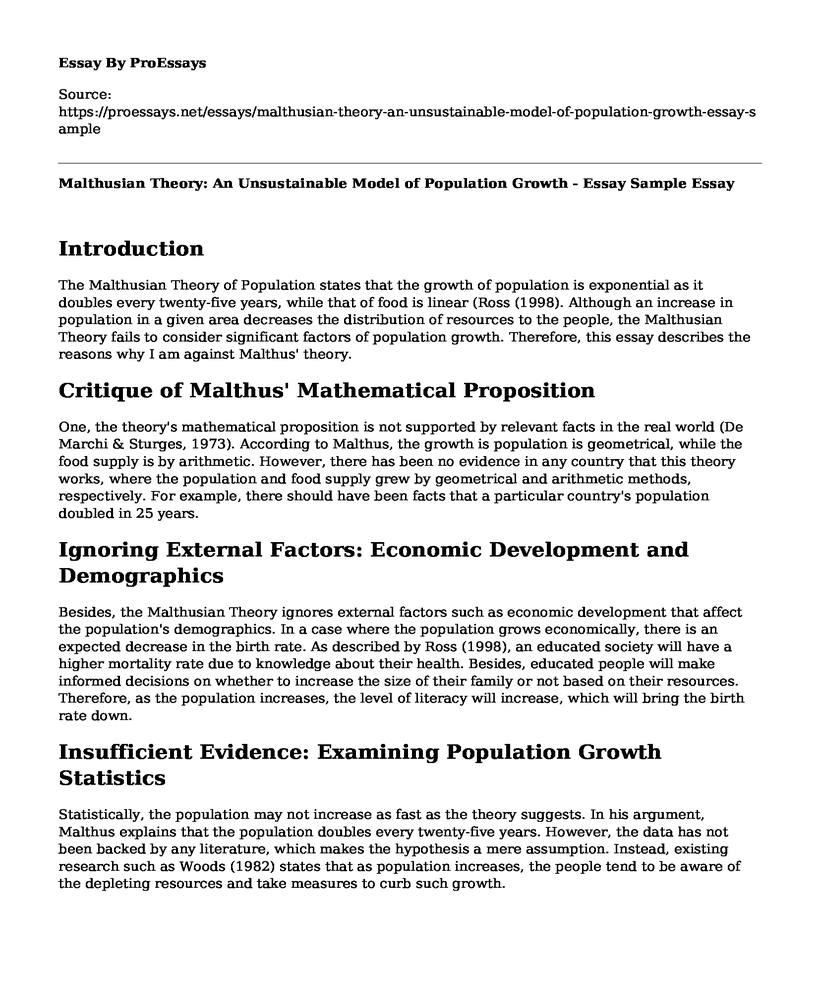Introduction
The Malthusian Theory of Population states that the growth of population is exponential as it doubles every twenty-five years, while that of food is linear (Ross (1998). Although an increase in population in a given area decreases the distribution of resources to the people, the Malthusian Theory fails to consider significant factors of population growth. Therefore, this essay describes the reasons why I am against Malthus' theory.
Critique of Malthus' Mathematical Proposition
One, the theory's mathematical proposition is not supported by relevant facts in the real world (De Marchi & Sturges, 1973). According to Malthus, the growth is population is geometrical, while the food supply is by arithmetic. However, there has been no evidence in any country that this theory works, where the population and food supply grew by geometrical and arithmetic methods, respectively. For example, there should have been facts that a particular country's population doubled in 25 years.
Ignoring External Factors: Economic Development and Demographics
Besides, the Malthusian Theory ignores external factors such as economic development that affect the population's demographics. In a case where the population grows economically, there is an expected decrease in the birth rate. As described by Ross (1998), an educated society will have a higher mortality rate due to knowledge about their health. Besides, educated people will make informed decisions on whether to increase the size of their family or not based on their resources. Therefore, as the population increases, the level of literacy will increase, which will bring the birth rate down.
Insufficient Evidence: Examining Population Growth Statistics
Statistically, the population may not increase as fast as the theory suggests. In his argument, Malthus explains that the population doubles every twenty-five years. However, the data has not been backed by any literature, which makes the hypothesis a mere assumption. Instead, existing research such as Woods (1982) states that as population increases, the people tend to be aware of the depleting resources and take measures to curb such growth.
The Role of Civilization in Population Control
On the other hand, Malthus ignored the role of civilization on population control. As more people become civilized, they aim for a higher standard of living (Woods (1982). Therefore, most people opt to marry later in life to ensure that they can provide for their families. Thus, the higher the standard of living reduces the birth rate. Similarly, civilization has increased equality; hence more women are educated and decide on the size of the family that they want. During the Malthus era, women were mostly housewives, which increase the birthrate.
Technology and Agriculture: Challenging Malthus' Assumptions
The Malthusian Theory ignores the role of technology in agriculture. In theory, Malthus bases his assumption on the size of land available for cultivating. To him, urbanization and technology will ultimately lead to a shortage of food. Instead, the opposite is exact. As more people move into urban centers, a ready market develops for value-added and processed food (Sakanko & David, 2018). Therefore, with urbanization, there is a need to preserve the food, hence creates a research gap. It is through such needs resulting from an increased population that inventions in agriculture have been made. Currently, a scientifically managed firm yields more than what a similar piece of land could a century ago.
Conclusion
Based on these facts, the Malthusian Theory is not applicable and hence am against it. The theory would be accurate if factors of production remained constant as it were during Malthus' time. However, with technology and civilization, man can be able to produce more, store for future use, and make informed decisions.
References
De Marchi, N. B., & Sturges, R. P. (1973). Malthus and Ricardo's inductivist critics: four letters to William Whewell. Economica, 40(160), 379-393.
Ross, E. B. (1998). Malthus factor. London: Zed books.
Sakanko, M. A., & David, J. (2018). An Econometric Validation of Malthusian Theory: Evidence in Nigeria. Signifikan: Jurnal Ilmu Ekonomi, 7(1), 77-90.
Woods, R. (1982). Theoretical population geography (pp. 102-130). London: Longman.
Cite this page
Malthusian Theory: An Unsustainable Model of Population Growth - Essay Sample. (2023, Apr 10). Retrieved from https://proessays.net/essays/malthusian-theory-an-unsustainable-model-of-population-growth-essay-sample
If you are the original author of this essay and no longer wish to have it published on the ProEssays website, please click below to request its removal:
- The Economic Side of Trump's Wall - Paper Example
- The Sunset Limited Attack - Paper Example
- One Woman, One Vote Documentary Essay
- Does Society Have Different Expectations for Boys Then for Girls? Essay
- Essay Sample on Anti-black Paranoia
- Responding to Emergencies: High-Rise Building Vulnerabilities - Essay Sample
- Essay on Dorothy Dandridge: Pioneering Black Actress, Singer, Dancer in Face of Racism







